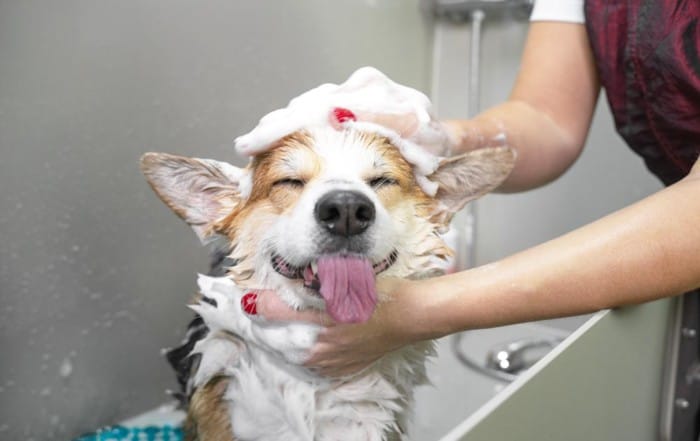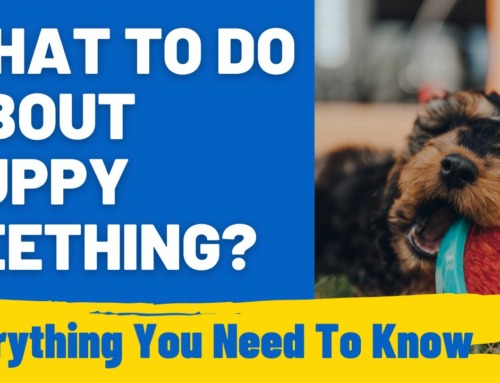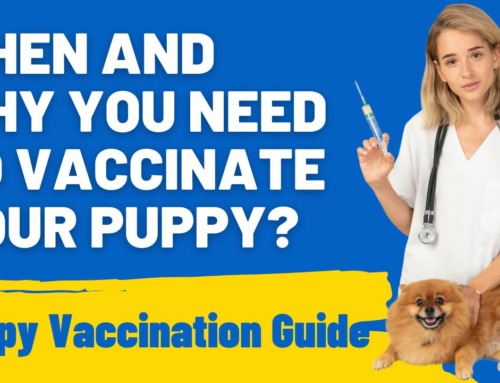There’s nothing more worrisome than a sick puppy! If your corgi puppy has diarrhea, you’re probably wondering if it’s something you need to be concerned about, and if there are ways you can help treat your corgi puppy at home.
Fortunately (and unfortunately), diarrhea can be the result of a variety of health problems, ranging from mild and not warranting a vet visit, to serious and potentially fatal.
We will cover the variety of reasons your corgi puppy may be experiencing diarrhea, how to treat diarrhea at home, as well as how to determine when your corgi puppy needs veterinary attention.
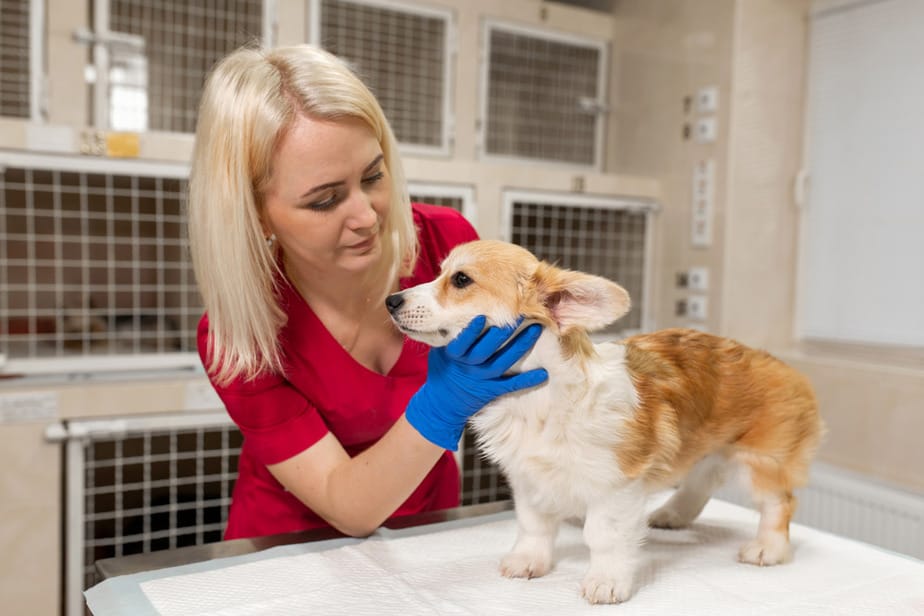
Reasons your corgi puppy may have diarrhea
Your corgi puppy may be experiencing diarrhea due to stress, a change in diet, eating something they shouldn’t have, or a more serious disease such as parvovirus. All dogs are likely to experience soft stools at some point, and often times, a mild case of diarrhea can be treated at home.
In general, if your puppy has diarrhea but is still playful and has no other symptoms, it’s not an emergency requiring veterinary attention.
Instead, continue to monitor your corgi puppy’s stool to ensure the diarrhea resolves, and it doesn’t continue.
Diarrhea that is ongoing is not only an indicator that something is wrong needing veterinary attention, but it is a risk for dehydration – which can be a serious issue. (Puppies can experience dehydration quicker than adult dogs)
Brief moments of soft stool or diarrhea, without any additional symptoms, can often be attributed to a small gastrointestinal upset or stress.
Because of this, it’s commonplace for dogs that are worried about boarding facilities to have loose stool the first day or two they arrive.
Signs to watch for that indicate the diarrhea is a sign of something worse include:
- lethargy
- dehydration
- blood in the stool
- lack of appetite
- vomiting
If your puppy is having uncontrollable diarrhea, rather than softer stools that occur outside on normal potty breaks, that is also a sign that their diarrhea is more severe and may need veterinary attention.
Parasites
Besides stress, internal parasites are another common cause for diarrhea in puppies.
You may not be able to see any of the parasites with your naked eye, as some types of these parasitic worms only shed their microscopic eggs in your dog’s stool.
Puppies are especially prone to parasites, primarily before they are old enough for heartworm prevention that often includes protection against other parasites as well.
Many veterinarians recommend deworming puppies at 2, 4, 6, and 8 weeks of age to ensure they go to their new homes parasite-free.
We recommend the following deworming products for your puppy.
For an affordable broad deworming solution try Sentry HC WormX Plus, which are conveniently available from Chewy.
For a more premium option that also includes fleas and heartworm, we recommend Trifecis Chewable Tablets. Use the list below according to your Corgi’s weight.
Trifexis Chewable Tablets for Dogs, 5-10 lbs
Trifexis Chewable Tablets for Dogs, 10.1-20 lbs
Or if your Corgi is full grown:
Trifexis Chewable Tablets for Dogs, 20.1-40 lbs
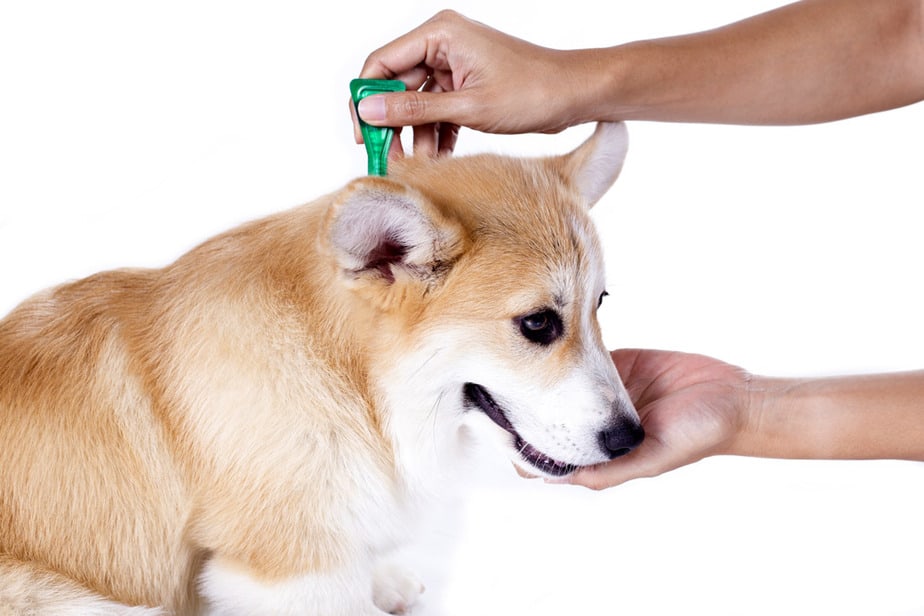
Parvovirus
One of the most sinister reasons for puppies to develop diarrhea is canine parvovirus. This disease is vaccinated against in the distemper combination vaccination that puppies receive, although (as any vaccine) it isn’t 100%.
Very young puppies may also not have received the vaccine at a time where their maternal antibodies have waned to allow the vaccine to work yet, either.
Severe, bloody diarrhea is a hallmark of parvovirus. This is often accompanied by vomiting, a fever, lethargy, and other symptoms of illness and disease in your puppy.
How to treat diarrhea in a corgi puppy at home
When in doubt, your corgi puppy’s veterinarian is likely available for at least a phone call to decide if your corgi puppy needs to be seen for their diarrhea.
In general, though, a puppy that is still happy and active otherwise, only experiencing mild diarrhea or soft, pudding-like stools, for only 1-3 days, can be treated at home.
While you shouldn’t restrict water, the first step to trying to resolve diarrhea at home is to remove your corgi puppy’s food and avoid feeding them for 12-24 hours.
This is done in order to give their body a break from being upset, and let their gastrointestinal tract calm down before trying to introduce food again.
After the break from their food, you will need to ease your corgi puppy back into eating. It’s often best to start with something bland, such as white rice and boiled chicken, rather than going straight back to feeding kibble.
Start by offering your puppy only a small amount of the chicken and rice, and then waiting an hour or two to see if your puppy’s stomach has settled.
If you don’t see any further diarrhea, you can try increasing the amount of rice and chicken after an hour or two.
While this diet is bland and ideal for recovering tummies, it’s not a balanced diet and shouldn’t be fed to your dog for more than a day or two.
Your dog will start missing out on the nutrients in their kibble that they need to live a healthy life otherwise.
When feeding a bland diet to your dog, some dogs will also benefit from a small amount of plain yogurt or pumpkin. Both products have a history of helping dogs recover from gastrointestinal upset.
Towards the end of their rice and chicken meals, you should start mixing in a small amount of their dog food, to get them used to eating their kibble again.
At this point, if the diarrhea re-emerges, it’s time to check with your corgi puppy’s veterinarian to determine the next steps.
They may recommend a veterinary visit so they can perform an exam and diagnostics to determine the cause of your puppy’s diarrhea.
They may also be able to offer guidance on medications that can be purchased through the vet clinic or over the counter that may aid in stopping your corgi puppy’s diarrhea.
Because dogs tend to eat things they shouldn’t, and lick things that can introduce germs to their body, diarrhea and gastrointestinal upset is a common problem in dogs.
Your veterinarian will be plenty familiar with dealing with diarrhea in dogs!
You might also like to read, Dog is Pooping Jelly: (What To Do)
Preventing diarrhea in a corgi puppy
As the saying goes, an ounce of prevention is worth a pound of cure.
Even though diarrhea can be a common occurrence in dogs, there are steps you can take to limit your corgi puppy’s risk of diarrhea in the future.
You should ensure your corgi puppy is on a monthly preventative that helps prevent against internal parasites, or receives regular fecal sample exams, in order to limit the risk that intestinal parasites may be the cause of diarrhea in your puppy.
In addition, it’s important to avoid letting your corgi eat things that aren’t meant to be eaten, such as sticks or other small items they may find on a walk.
Teaching your dog to leave these items alone is going to be a useful skill for keeping your corgi puppy happy.
Limiting the amount of table scraps or people food that your corgi puppy eats is also important.
Not only can too many table scraps cause diarrhea, but it can lead to an imbalanced diet and contribute to weight gain – which is especially harmful in long-backed dogs like corgis.
Finally, if you decide to switch your corgi’s food, you should make sure to transition them slowly. Start by mixing a small amount of the new food in with a large amount of the old food.
As each day goes by, mix less of the old food and more of the new food, until your corgi is eating only the new food.
Use this table for transitioning from their current diet to a new one:
This slow transition process is the best way to prevent diarrhea and gastrointestinal upset when changing brands or flavors of food if you are trying to find the food that is best for your individual dog.
So your Corgi Puppy has Diarrhea…
There’s nothing more worrisome than a sick puppy! If your corgi puppy has diarrhea, you're probably wondering if it’s something you need to be concerned about, and if there are ways you can help treat [...]
Corgi Puppy Aggression: What You Should Do
We all hope that raising a puppy will go smoothly, but there are often many bumps along the way. In some cases, you may find that your puppy starts to display aggressive behavior. It can [...]
Corgi won’t stop barking? (Here’s what to do!)
While there are many wonderful things about corgis, and dogs in general, there are some behaviors that also come along that we wish we could avoid. Barking is one of the major concerns that many [...]
How Often to Bathe a Corgi Puppy (Bath Guide)
Puppies are prone to getting dirty as they play and explore the world, and sometimes Corgi puppies can get especially dirty, due to their close proximity to the ground and their coat. How often you [...]





